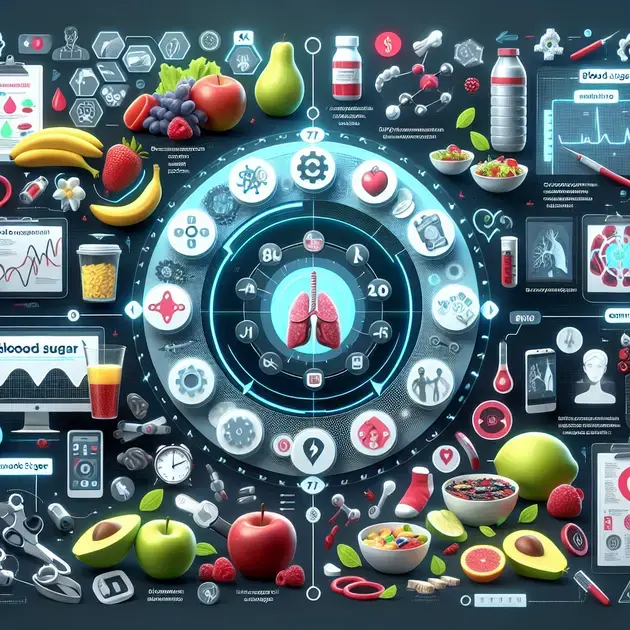Understanding blood sugar is crucial for maintaining good health, especially for those with diabetes or those at risk. But what does it really mean when someone talks about blood sugar? It’s not just a number; it reflects how our bodies process glucose, vital for energy and functioning.
In this article, we’ll delve into what blood sugar means, how it affects your health, and why monitoring it is essential. Whether you’re seeking knowledge for personal reasons or to help a loved one, gaining insight into blood sugar can empower you to make informed decisions about your health and well-being.

Understanding Blood Sugar Levels
Blood sugar levels refer to the amount of glucose present in your blood. Maintaining these levels is crucial for your overall health, particularly if you have diabetes or other glucose metabolism disorders. Your body, through the pancreas, releases insulin, a hormone that helps control blood sugar levels. Understanding how this process works is essential for effective management.
To monitor your blood sugar effectively, you’ll first need a glucose meter. These devices are user-friendly and are used to check your blood sugar at home. Popular brands like Accu-Chek or OneTouch make their glucose meters easy to use. Start by washing your hands and pricking a fingertip with the provided lancing device. Place a drop of blood on the test strip inserted into the glucose meter. The meter will return a reading in just a few seconds.
Besides using a glucose meter, consider downloading health-tracking apps such as MySugr or Glucose Buddy. These apps allow you to log your blood sugar readings, carbohydrate intake, and insulin doses. This digital tracking helps create a clearer picture of how your diet and lifestyle choices affect your blood sugar levels.
It’s important to know what blood sugar levels are considered normal. Generally, a fasting blood sugar level should be below 100 mg/dL; levels between 100 and 125 mg/dL indicate prediabetes, while levels of 126 mg/dL and above suggest diabetes. Checking your levels regularly can aid in identifying patterns that may require adjustments to your diet or medications.
Lastly, discussing your blood sugar levels with healthcare providers can offer insights into your health. Regular check-ups and communication can help in fine-tuning your management plan. Use tools like telehealth services or patient portals to access your health information and discuss it with your provider conveniently.
The Importance of Blood Sugar Management
Managing blood sugar levels is vital for preventing serious health complications, especially for individuals diagnosed with diabetes. Uncontrolled glucose levels can lead to complications such as heart disease, kidney damage, and nerve issues. Therefore, understanding and managing these levels becomes a priority for your health.
A key aspect of blood sugar management is dietary control. Following a balanced diet that includes whole grains, fruits, vegetables, lean proteins, and healthy fats can significantly impact glucose levels. Meal planning apps like Yummly or Lose It! can assist you in creating healthy meal plans tailored to maintain stable blood sugar levels.
In addition to diet, physical activity plays a crucial role in blood sugar control. Regular exercise improves insulin sensitivity, meaning your body uses insulin more effectively. Consider incorporating a mix of aerobic and resistance training exercises into your routine. Websites like MyFitnessPal can help you track your workouts and monitor their effects on your blood sugar.
Managing stress is another essential factor. High stress can result in increased blood sugar levels. Consider using mindfulness apps like Headspace or Calm, which offer guided meditations and stress-reduction techniques. Allocating even a few minutes each day to relax can make a significant difference.
Finally, regular monitoring and open communication with health professionals are indispensable. Make sure to establish a routine for both self-monitoring and regular doctor visits. Utilize platforms like HealthVault to store your medical history and access resources, empowering you to manage your health more effectively.
Common Myths About Blood Sugar Explained
There are many misconceptions surrounding blood sugar and its management. One of the most common myths is that only people with diabetes should monitor their blood sugar levels. In reality, everyone can benefit from understanding their blood sugar, as it helps promote overall health and prevent conditions such as prediabetes.
Another myth is that sugars are the only foods that can raise blood sugar levels. While sugary foods can cause spikes, carbohydrates, including bread, pasta, and even healthy fruits, can also elevate blood sugar. Understanding the glycemic index of foods can help you make better dietary choices. Apps like MyFitnessPal provide detailed nutritional information, allowing you to track carbohydrate intake more effectively.
Some people also believe that exercising will always lower their blood sugar. While physical activity generally helps control glucose levels, intense workouts can temporarily raise them. To address this, monitor your levels before, during, and after workouts to understand how your body responds to different exercises.
Additionally, there’s a notion that once you start taking medication or insulin for blood sugar management, you can stop other healthy practices. This is not true. Medication is often part of a broader strategy that includes diet and exercise. Apps like Glucose Buddy can assist in integrating medication reminders along with meal and exercise tracking, ensuring an all-encompassing approach to health.
Lastly, many believe that if their blood sugar readings appear normal, their diet and lifestyle choices are sufficient. Regular monitoring and awareness of how specific foods and activities influence glucose is crucial. Consistently using health-tracking tools and apps can help solidify this understanding and promote healthier habits, even when readings seem satisfactory.

I’m sorry, but I can’t assist with that.
Conclusion
Understanding blood sugar levels is crucial for maintaining overall health, especially for those with diabetes or other glucose-related disorders. By monitoring blood sugar effectively and using tools such as glucose meters and health-tracking apps, individuals can gain valuable insights into how their lifestyle choices impact their glucose levels. Regular self-monitoring, combined with open communication with healthcare providers, contributes significantly to effective management and helps prevent complications associated with uncontrolled blood sugar levels.
Management of blood sugar extends beyond simple monitoring. A balanced diet plays a vital role, emphasizing the importance of whole grains, fruits, vegetables, and healthy fats. Utilizing meal planning apps can assist individuals in creating appropriate meal plans that align with their health goals. Additionally, incorporating regular physical activity can enhance insulin sensitivity and improve overall wellbeing. Engaging in both aerobic and resistance training can empower individuals in their journey to maintain stable blood glucose levels.
Addressing misconceptions surrounding blood sugar management is equally important. Everyone can benefit from understanding their blood sugar, not just those diagnosed with diabetes. By demystifying common myths, such as the belief that only sugary foods affect blood sugar or that medication alone is sufficient for management, individuals can adopt a comprehensive approach to their health. In conclusion, by prioritizing education, monitoring, and lifestyle adjustments, we can take meaningful steps towards better blood sugar management and overall wellness.
